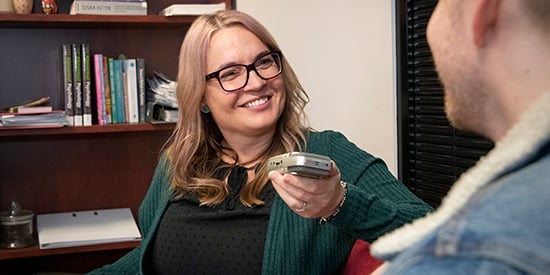Deakin study examines why men choose to be childless, and the impact
Media release
While more Australian men are choosing to remain childless, they can often be hesitant to have a serious discussion about this choice with their partner, according to a new Deakin University research.
In a recently published paper, Deakin School of Psychology researchers are among the first in Australia to examine why some men at the peak age for first-time fatherhood are choosing not to have children, and their experience navigating the choice.
Lead researcher Imogene Smith said the majority of the men she interviewed in long-term relationships had never had a serious conversation with their partner about children, or had put off that conversation for many years.
“Many of the men in the study felt sure they were ‘on the same page’ as their partners because they often shared banter and jokes about not having children. But we found there was a lot of worry around having dedicated conversations about intention to have children,” Ms Smith said.
“One of the men had been in a relationship for a decade before he raised it seriously with his partner, and he said he was so frightened he had to have a few drinks first.
“Another man said that he and his wife hadn’t had a real sit-down conversation about it, despite the fact that he had had a vasectomy. Another joked that he had better have a conversation soon since he and his partner were about to get married.”
Ms Smith said this might be a problem if couples were not having these important conversations before the biological clock left them short of other options.
“We tend to talk a lot about the female biological clock, but we don’t speak enough about the male biological clock,” she said.
“Men can face declining fertility as they age, albeit to a lesser degree than women, but overall men’s chances of fathering a healthy child do decline somewhat across the years.
“In the past, evidence has shown childless men have lower health outcomes, are at higher risk of social disconnection, and face negative stigma. So research like this is about helping us to support the growing number of men who may be choosing not to become fathers live a happy and healthy life, as well as those who may want to become fathers but cannot.
“It is important that people feel supported, whatever their life choices or life path.”
The Deakin research followed a group of men from the Men and Parenting Pathways Study, a longitudinal study tracking more than 600 young Australian men between the ages of 28 and 34.
“In this wider study we have been looking generally at men’s family pathways, but 3 per cent of participants indicated they did not want children at all,” Ms Smith said.
“So a qualitative analysis like this one allows us to drill down further and conduct a detailed exploration of these men’s reasons for choosing to remain childless, and the effects they thought this would have on their lives.”
Ms Smith said the 11 men she interviewed in-depth for her paper – some single, most in straight or same-sex relationships – had all identified they did not want children ‘at all’.
“This is a particularly interesting age to look at, as past research has found that younger or older age groups tend to be much more certain about a desire not to have kids,” Ms Smith said.
“It might be easier to be unequivocal when you’re young and not facing any outward pressure to have kids, or when you’re older and feel the opportunity has passed by. But when you are in this peak age for fatherhood, you’re seeing people starting families all around you and that makes it hard to take a counter-normative stance.
“We certainly saw that reflected in the responses we had from the men we interviewed who really saw being childless as part of their identity of being unconventional, different or ‘weird’, and challenging social norms.
“Other strong reasons we saw for men not wanting to have children included a loss of freedom and increased responsibility, perceiving negative experiences in friends and family, influence from a partner, and also fear over the state of the world, particularly issues like climate change and overpopulation.”
Ms Smith said in previous decades it was just assumed that men in relationships would have children, but that was changing, with estimates up to 10 per cent of Australian men were intentionally childless.
“There’s a lot of research around why women choose to remain childless, but not much at all about men, especially gay men. Which is interesting because in Australia and many other countries globally, rates of childlessness are higher in men, and some of the studies that have been done on both sexes show men who decide not to have children struggle with this decision more than women,” she said.
“In our ‘pro-natalist’ society, men are often framed as fathers, we even sometimes have financial incentives from government to encourage childbirth, and so it can often feel like there’s a strong stigma against remaining childless.”
The paper ‘When men choose to be childless: an interpretative phenomenological analysis’ was published in the latest edition of the Journal of Social and Personal Relationships.
Share this story

